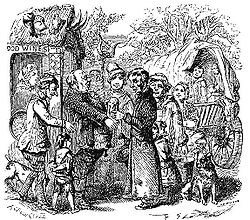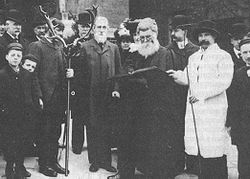
Swearing on the Horns
Encyclopedia

London
London is the capital city of :England and the :United Kingdom, the largest metropolitan area in the United Kingdom, and the largest urban zone in the European Union by most measures. Located on the River Thames, London has been a major settlement for two millennia, its history going back to its...
suburb of Highgate
Highgate
Highgate is an area of North London on the north-eastern corner of Hampstead Heath.Highgate is one of the most expensive London suburbs in which to live. It has an active conservation body, the Highgate Society, to protect its character....
during the 17th, 18th and 19th centuries. The oath consists of a series of statements read by a clerk, confirming one's dedication to merriment and debauchery; those being sworn in would agree to each statement, kiss or salute a set of horns
Horn (anatomy)
A horn is a pointed projection of the skin on the head of various animals, consisting of a covering of horn surrounding a core of living bone. True horns are found mainly among the ruminant artiodactyls, in the families Antilocapridae and Bovidae...
, and be entered in a logbook
Logbook
A logbook was originally a book for recording readings from the chip log, and is used to determine the distance a ship traveled within a certain amount of time...
for posterity. The proceedings were typically overseen by the landlord—referred to as the Master, the Father, or the Host—often dressed in formal costume, such as that of a barrister
Barrister
A barrister is a member of one of the two classes of lawyer found in many common law jurisdictions with split legal professions. Barristers specialise in courtroom advocacy, drafting legal pleadings and giving expert legal opinions...
. In some houses, an "initiation fee" of money or drinks was required in addition to the oath; in others, the fee could be paid to bypass the ceremony altogether. Participants were then awarded the title of "Freemen of Highgate".
The ceremony was a source of amusement for regular customers, who would do their best to convince newcomers to take part in the swearing in. The details of the swearing took various forms across the years and from pub to pub, but maintained the common themes of the horns and many of the individual statements. It seems clear that most participants understood it to be a tourist trap
Tourist trap
A tourist trap is an establishment, or group of establishments, that has been created with the aim of attracting tourists and their money...
, but were happy to take part in it just the same.
Oath
While some versions are quite long—one source depicts a ceremony with six stanzas—the best-known points are:The exception clauses make clear that the oath is not an oath at all; one may do as one pleases. Other parts of the oath include pledges to be kind to one's wife, to remember that the man is the head of his household, and to bring new initiates on one's next visit.
Privileges
Swearing on the Horns and becoming Freemen of Highgate conferred several privileges, though the privileges were subject to several conditions and often turned out to be no privilege at all. The immediate reward was to kiss the prettiest woman in the pub; if no pretty women were to be found, the new initiate had to settle for less. If a Freeman in need of a rest was in Highgate, he could kick a pig out of a ditch and take its place. But if there were three pigs in the ditch, he could only chase away the middle one and sleep between the other two. If a Freeman found himself penniless in Highgate, he could have free drinks for himself and his friends, but if any money was found on him (or if it was found he had given it to his friends to hold) he had to buy a round of drinksRound of drinks
A round of drinks is a set of alcoholic beverages purchased by one person in a group for that complete group. The purchaser buys the round of drinks as a single order at the bar. In many places it is customary for people to take turns buying rounds....
for the house.
History
The earliest confirmed mention is in a burlesqueBurlesque
Burlesque is a literary, dramatic or musical work intended to cause laughter by caricaturing the manner or spirit of serious works, or by ludicrous treatment of their subjects...
routine performed in Haymarket Theatre
Haymarket Theatre
The Theatre Royal Haymarket is a West End theatre in the Haymarket in the City of Westminster which dates back to 1720, making it the third-oldest London playhouse still in use...
in 1742. The 1785 edition of Grose's Classical Dictionary of the Vulgar Tongue held that the oath had been invented by a landlord of one of the public houses, to entertain guests and con newcomers out of some money. According to Grose, the custom had fallen into disuse at that time, which—considering its wide popularity in the early 19th century — indicates that swearing on the horns came in and out of fashion over the centuries.
At one time, members of all social class
Social class
Social classes are economic or cultural arrangements of groups in society. Class is an essential object of analysis for sociologists, political scientists, economists, anthropologists and social historians. In the social sciences, social class is often discussed in terms of 'social stratification'...
es took part in the swearing in. In Childe Harold's Pilgrimage
Childe Harold's Pilgrimage
Childe Harold's Pilgrimage is a lengthy narrative poem in four parts written by Lord Byron. It was published between 1812 and 1818 and is dedicated to "Ianthe". The poem describes the travels and reflections of a world-weary young man who, disillusioned with a life of pleasure and revelry, looks...
, Lord Byron alludes to it.:
Young people would make mock pilgrimages from the city to experience the festivities, and by 1826 there were at least 19 different pubs in Highgate performing the ceremony. Some pubs would display a set of horns over their doors to indicate that travellers could be sworn in and made Freemen there.
By the mid-19th century, however, the tradition began to lose its popularity and had almost completely died out by 1875.

George Walter Thornbury
George Walter Thornbury was an English author. He was the son of a London solicitor, reared by his aunt and educated by her husband, Reverend Barton Bouchier. A journalist by profession, he also wrote verse, novels, art criticism and popular historical and topographical sketches...
's Old and New London from 1874. Thornbury believes the custom is at least as old as the Reformation
Protestant Reformation
The Protestant Reformation was a 16th-century split within Western Christianity initiated by Martin Luther, John Calvin and other early Protestants. The efforts of the self-described "reformers", who objected to the doctrines, rituals and ecclesiastical structure of the Roman Catholic Church, led...
and states that the text "was originally intended as a parody on the admission of neophytes into religious guilds and confraternities by the clergy of the Catholic Church". He holds that the ceremony began at the Gate House Inn (the site of the gate from which Highgate draws its name) as a club for travellers along the cattle route to Smithfield
Smithfield, London
Smithfield is an area of the City of London, in the ward of Farringdon Without. It is located in the north-west part of the City, and is mostly known for its centuries-old meat market, today the last surviving historical wholesale market in Central London...
.
In 1906, members of the Hampstead Antiquarian and Historical Society held a public re-enactment of the ceremony at what was by then known as the Old Gate House Hotel. Throughout the 20th century the tradition was once again revived, and continues to be conducted on special occasions at certain Highgate pubs: The Wrestlers conducts theirs twice annually, under a set of stag antlers. In 2007, The Flask pub conducted the ceremony with a set of 200-year-old ram's horns taken from the Coopers Arms, as part of their beating the bounds
Beating the bounds
Beating the bounds is an ancient custom still observed in some English and Welsh parishes. A group of old and young members of the community would walk the boundaries of the parish, usually led by the parish priest and church officials, to share the knowledge of where they lay, and to pray for...
festivities.

